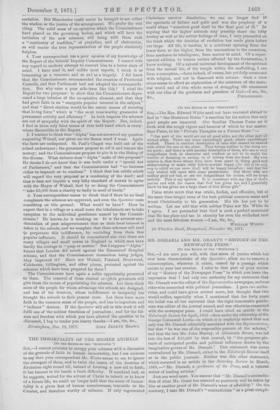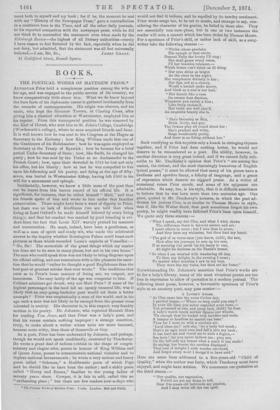MR. DISRAELI AND MR. GRANT'S "HISTORY OF THE NEWSPAPER PRESS."
[TO THR EDITOR OF THE "SPECTATOR,"]
Sin,-1 am sure you will, with that sense of justice which has ever been characteristic of the Spectator, allow me to remove a misconception, wherever it exists, caused by a passage which occurs in your last number. I refer to that part of your review of my " History of the Newspaper Press" in which you leave the impression that I had only one authority for my statement that Mr. Disraeli was the editor of the Representative newspaper, and was otherwise connected with political journalism. I gave two autho- rities, and could have given several more, but thought that two would suffice, especially when I mentioned that for forty years the belief was all but universal that the right honourable gentle- man was editor of the journal named, and was otherwise connected with the newspaper press. I could have cited an article in the Edinburgh Review for April, 1853—then under the editorship of Sir George Cornewall Lewis—in which it is explicitly stated that not only was Mr. Disraeli editorially associated with the Representative, but that "he was one of the responsible parents of the scheme," and that the late Mr. John Murray, of Albemarle Street, was led into the loss of £20,000 by that journal, by "the gorgeous pic- tures of anticipated profits and political influence drawn by the imaginative genius of Mr. Disraeli." This statement was never contradicted by Mr. Disraeli, either in the Edinburgh Review itself or in the public journals. Neither was this other statement, which occurred in an article in the Saturday Review in March, 1868,—" Mr. Disraeli, a gentleman of the Press, and a veteran writer of leading articles."
Just one word more. You assume that "Mr. Disraeli's contradic- tion of what Mr. Grant has asserted so positively will be taken by him as another proof of Mr. Disraeli's want of affability." On the contrary, I take Mr. Disraeli's " contradiction " as a great coMpli-
ment both to myself and my book ; for if he, the moment he met with my "History of the Newspaper Press," gave a contradiction in a courteous tone in the Times, and all the other daily journals, to his reported connection with the newspaper press, while he did not think fit to contradict the statement even when made by the Edinburgh Review—the highest of all literary authorities—surely I have reason to feel flattered by the fact, especially, when he did not deny, but admitted, that the statement was all but universally
believed.—I am, Sir, &c., JAMES GRANT. 41 Guildford Street, llussell Square.



































 Previous page
Previous page